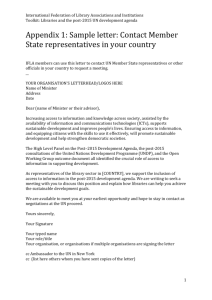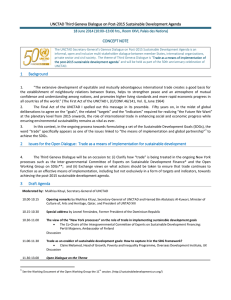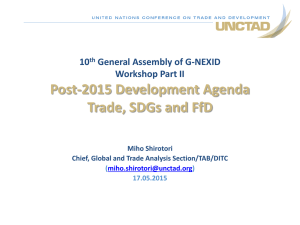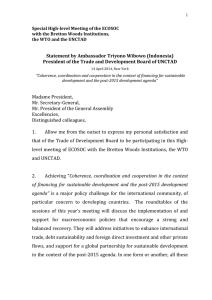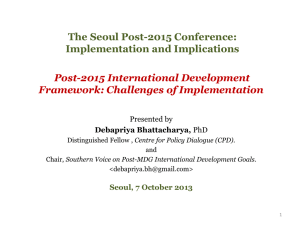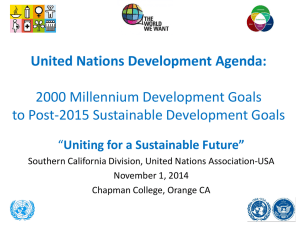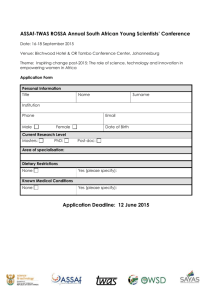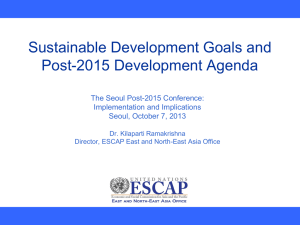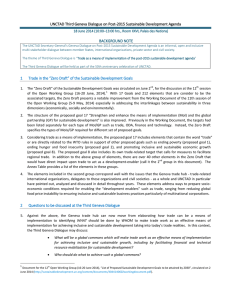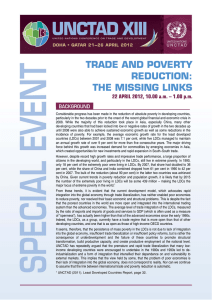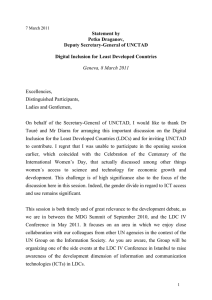Background note
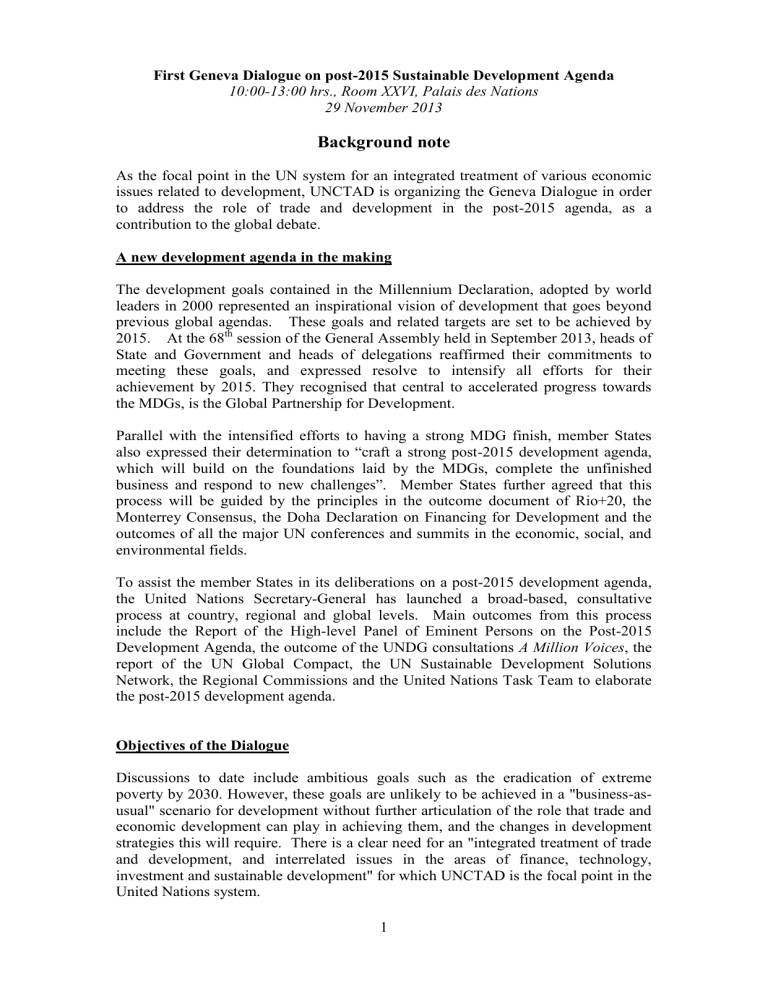
First Geneva Dialogue on post-2015 Sustainable Development Agenda
10:00-13:00 hrs., Room XXVI, Palais des Nations
29 November 2013
Background note
As the focal point in the UN system for an integrated treatment of various economic issues related to development, UNCTAD is organizing the Geneva Dialogue in order to address the role of trade and development in the post-2015 agenda, as a contribution to the global debate.
A new development agenda in the making
The development goals contained in the Millennium Declaration, adopted by world leaders in 2000 represented an inspirational vision of development that goes beyond previous global agendas. These goals and related targets are set to be achieved by
2015. At the 68 th
session of the General Assembly held in September 2013, heads of
State and Government and heads of delegations reaffirmed their commitments to meeting these goals, and expressed resolve to intensify all efforts for their achievement by 2015. They recognised that central to accelerated progress towards the MDGs, is the Global Partnership for Development.
Parallel with the intensified efforts to having a strong MDG finish, member States also expressed their determination to “craft a strong post-2015 development agenda, which will build on the foundations laid by the MDGs, complete the unfinished business and respond to new challenges”. Member States further agreed that this process will be guided by the principles in the outcome document of Rio+20, the
Monterrey Consensus, the Doha Declaration on Financing for Development and the outcomes of all the major UN conferences and summits in the economic, social, and environmental fields.
To assist the member States in its deliberations on a post-2015 development agenda, the United Nations Secretary-General has launched a broad-based, consultative process at country, regional and global levels. Main outcomes from this process include the Report of the High-level Panel of Eminent Persons on the Post-2015
Development Agenda, the outcome of the UNDG consultations A Million Voices , the report of the UN Global Compact, the UN Sustainable Development Solutions
Network, the Regional Commissions and the United Nations Task Team to elaborate the post-2015 development agenda.
Objectives of the Dialogue
Discussions to date include ambitious goals such as the eradication of extreme poverty by 2030. However, these goals are unlikely to be achieved in a "business-asusual" scenario for development without further articulation of the role that trade and economic development can play in achieving them, and the changes in development strategies this will require. There is a clear need for an "integrated treatment of trade and development, and interrelated issues in the areas of finance, technology, investment and sustainable development" for which UNCTAD is the focal point in the
United Nations system.
1
It is against this background UNCTAD will convene an open and inclusive, multistakeholder dialogue with relevant Geneva-based entities that will include Intergovernmental organisations, member states, civil society and private sector among others. The objective of this dialogue is to address the role of trade and development in the post-2015 agenda, as an input to the processes in New York. It also aims at shedding light on the question: how UNCTAD can contribute to the elaboration of the goals as well as to the final achievement of the goals.
Issues to be addressed
The last decade has witnessed a period of rapid growth of international trade, investment and knowledge flows, as well as rising commodity prices and increased income from remittances. This environment has supported faster economic growth in many developing countries. In a number of them, international trade in goods and services, by creating jobs and widening opportunities for income creation, has contributed to lifting millions of people out of extreme poverty.
However, the developmental benefits of international trade, investment and technology flows do not accrue automatically; many countries, particularly but not only the LDCs, and vulnerable groups (poor, women and youth) remain marginalized from the international economic system and have been unable to establish more inclusive and sustainable growth paths.
Persistent development challenges facing the poorest and most vulnerable countries in the world. These include the Least Developed Countries (LDCs) and other lowincome developing countries. UNCTAD studies have shown these groups of countries remain the main locus of extreme poverty in the world. For example, LDCs’ share of the global population living in extreme poverty has doubled since 1990, in spite of faster economic growth and concerted efforts, both at global and national levels, towards achieving several MDG targets by 2015. The majority of LDCs are off-track to meet most human development MDGs. This has become a major impediment to the graduation objective elaborated in the Istanbul Programme of Action, which is to enable at least half of the LDCs to meet the graduation criteria by 2020.
Therefore, the transition from the MDGs to a new global development agenda requires concerted international actions, including stable and long-term financing for development, which is critical for sustainable and inclusive growth in many developing countries, particularly the LDCs.
Even nations with a higher degree of development risk being caught in the so-called
"middle-income trap", and still a large proportion of the world's poor today also reside in these middle-income countries. They face capacity constraints and other barriers to gaining access to higher value added activities within global value chains.
The recent global financial and economic crisis has been a sober reminder that economic and social imbalances and inequalities, both within and between countries, if left to correct themselves, are likely to produce damaging and destructive outcomes, particularly for vulnerable countries and communities.
2
A supportive post-2015 international development agenda must ensure, above all, that sufficient resources are available at appropriate cost and used to encourage and supplement national resource mobilization. The future global development agenda should also look to build a more equitable global trading system beyond the ambitions of the Doha Round, to provide additional resources to help strengthen productive sectors and diversify export profiles, including through support for infrastructure development.
Achieving the goals envisaged thus requires improvements in the global economic system in relation to international trade and related issues of finance, technology and investment, as well as the implementation of more effective development strategies at the national level, as outlined in successive UNCTAD reports, to generate the requisite development benefits and minimize the potential costs. There is need for proper governance of globalization, and an appropriate development model to ensure a durable process of poverty reduction and sustainable development.
3
